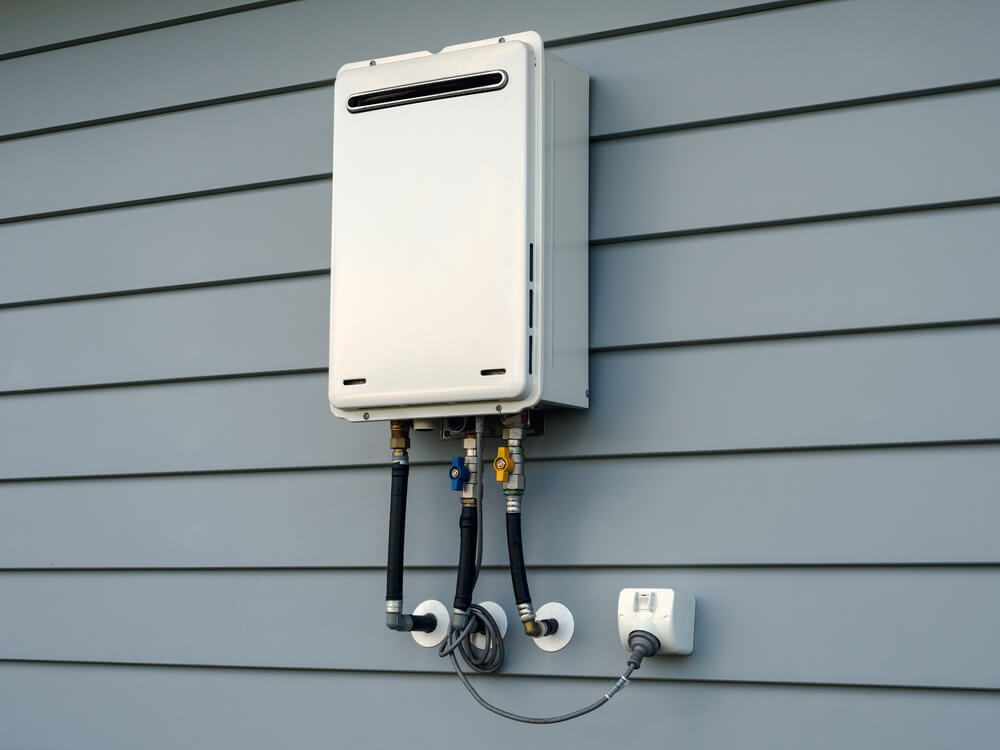Crucial Pros Of Adopting Tankless Water Heaters
Crucial Pros Of Adopting Tankless Water Heaters
Blog Article
This post further down involving 5 Benefits of Tankless Water Heaters is truly fascinating. You should give it a look.

In a world where convenience and effectiveness preponderate, it's not a surprise that house owners are constantly on the lookout for smarter means to handle their home's power usage and convenience. One development that has steadily acquired appeal is the tankless hot water heater. Yet just what makes these systems stand out from the standard tank-based versions a lot of us matured with? Let's dive in and check out the advantages of tankless hot water heater, assisting you determine if it's time to make the button in your house.
Introduction
Photo this: you enter the shower after a lengthy day, expecting a calming waterfall of warm water, only to be welcomed by icy beads because the last person used everything up. Noise familiar? Conventional hot water heater save a fixed quantity of warm water, indicating you go to the grace of that tank's supply. Tankless systems, on the other hand, heat water on demand. Say goodbye to going out mid-shower, say goodbye to fumbling with schedules simply to make sure warm water is offered.
Recognizing Tankless Water Heaters
What Are Tankless Hot Water Heater?
Tankless hot water heater, occasionally referred to as on-demand or instant hot water heater, provide hot water just as it's needed. Rather than keeping gallons of pre-heated water, these units kick into activity the minute you turn on the tap. Water travels through a warmth exchanger, warming up in real-time, suggesting you obtain a continuous circulation of warm water without the requirement for a big tank resting lazily by.
How Do They Vary from Traditional Equipments?
Standard heating units hold a storage tank of hot water, utilizing power to keep that container at a regular temperature level. Tankless devices remove the standing supply, reducing squandered power and the cumbersome impact of a huge cylinder. Essentially, you're upgrading from a "accumulation" mindset to a "made-to-order" strategy.
Typical Types of Tankless Systems
Tankless hot water heater usually are available in two ranges: gas and electrical. Gas models tend to deliver higher flow rates, perfect for larger homes, while electrical designs frequently offer smaller sized homes and are typically less complicated to mount. Furthermore, some systems are designed for point-of-use (serving one component) while others can manage the entire home's warm water demands.
Key Benefits of Tankless Hot Water Heater
Power Effectiveness and Expense Cost Savings
Say goodbye to heating a titan tank's worth of water and maintaining it cozy throughout the day. Tankless heating systems reduce standby energy losses, which can lower utility bills. While the initial cost might be higher, the lasting financial savings usually validate the investment.
3. Space-Saving Layout
If your home is short on storage, getting rid of the cumbersome storage tank maximizes useful area. Tankless devices are small and can typically be placed on walls, tucked away in corners, or installed in limited utility wardrobes without grabbing all of the entire area.
4. Longer Life-span
A well-maintained tankless water heater can outlive its tank-based relative. Traditional containers might last 10-15 years, while tankless models can keep downing along for twenty years or even more, making them a solid investment in time.
1. Limitless Hot Water Supply
Ever before needed to arrange showers so every person gets their fair share of warm water? With tankless, that ends up being a distant memory. As long as the heater's circulation ability isn't exceeded, you can take back-to-back showers without developing into a popsicle.
5. Improved Water Top Quality
Saving water in a tank can occasionally bring about debris buildup or a somewhat "off" taste. With tankless systems, fresh water is heated instantly, reducing the chances of debris build-up and possibly providing cleaner-tasting water.
Considerations Before Changing
Though the advantages are compelling, it's important to consider a few elements prior to totally committing.
Evaluating Your Home's Water Usage Patterns
If your home all at once utilizes several fixtures with high hot water demand, make sure the device's circulation price fulfills your requirements. Recognizing your usage patterns aids you pick the right size and sort of tankless heating unit.
Maintenance and Care Tips
Tankless systems are reasonably low upkeep, but they aren't set-it-and-forget-it devices.
Routine Cleansing and Descaling
Difficult water minerals can build up in the warm exchanger, affecting performance. Regular descaling (frequently recommended annually) keeps the device going for peak performance.
Yearly Professional Assessments
A yearly checkup from a professional ensures minor concerns are captured early. They'll examine the system's performance, search for leakages, and help maintain optimal performance.
Preliminary Investment Prices
Tankless heaters normally include a greater ahead of time price tag. In between the device itself and prospective installment adjustments, the first price may give you sticker shock. Yet bear in mind to view it as a long-term financial investment.
Installation Requirements
Depending on your home's facilities, you may need added electrical capacity or gas line upgrades. Guarantee you understand the installment demands and talk to a specialist to stay clear of surprises.
Ensuring Proper Ventilation
For gas models, proper air flow is vital to safely get rid of exhaust gases. Make certain airing vent systems are tidy and correctly set up to prevent any possible safety threats.
Contrasting Different Brands and Versions
Not all tankless hot water heater are produced equivalent.
Investigating Trusted Makers
Look for respectable brand names with a history of creating quality systems. A dependable maker commonly provides far better client support and longer service warranties.
Setup: Do It Yourself or Professional?
While some homeowners cherish tackling tasks themselves, tankless setup may not be the best time to burst out the tool kit.
Pros and Cons of Do It Yourself Setup
A DIY set up could conserve money, however it features dangers. Incorrect setup can cause inadequacy or safety problems. If you come in handy and have experience, it might be feasible-- yet wage caution.
Reading Testimonials and Individual Comments
Customer reviews and comments from next-door neighbors or buddies who have gone tankless can provide important insights. Sometimes, real-life experiences can be more informing than advertising and marketing sales brochures.
When to Call an Expert Plumbing Technician
For the majority of, calling a pro makes certain everything's done correctly. A professional plumber comprehends neighborhood codes, sizing needs, and airing vent criteria, minimizing the threat of incidents.
Making best use of Effectiveness
You've invested in a tankless unit-- currently optimize its performance.
Optimal Temperature Level Settings
Many people establish their systems in between 120-140 F. Adjusting the temperature can boost convenience and savings. Experiment to find a wonderful area that does not lose energy.
Pairing with Low-Flow Fixtures
Intend to extend your device's capabilities? Think about mounting low-flow showerheads and faucets. They decrease water use, allowing your tankless system to supply a constant stream of hot water without straining.
Environmental Effect
Tankless hot water heater line up with greener living objectives.
Lowered Carbon Impact
By utilizing less power and only heating water as required, tankless systems can reduce your home's carbon footprint, reducing your ecological impact.
Preserving Natural Resources
Less power intake and much less thrown away warm water translate right into less natural resources being utilized, an ecological win-win.
That Profits Many from Tankless Heating units?
The charm of tankless heaters is that they can match a range of households.
Huge Family Members vs. Single Occupants
Large family members may like the unlimited hot water supply, while single passengers value the energy cost savings from not warming an entire storage tank for simply someone's morning shower.
Home Owners with Minimal Room
If your home is short on square video, shedding the cumbersome tank liberates space for various other essentials-- or perhaps just extra elbow room.
Eco-Conscious Consumers
Going tankless aligns with eco-friendly values, ensuring you're not squandering power or sources.
Future Patterns in Tankless Hot Water Heater
The globe of home devices is ever-evolving, and tankless water heaters are no exemption.
Advancements in Modern technology
R&D is continuously improving warm exchangers, making systems extra efficient and sturdy. Future models could be also quieter, more compact, and much better suited for differing climates.
Smart Home Integration
Imagine adjusting your hot water heater's temperature via an application or obtaining maintenance notifies on your phone. As wise home technology developments, we'll see more connectivity and comfort.
Conclusion
Choosing a tankless hot water heater is greater than simply updating your home's hot water system; it's investing in long-lasting convenience, energy efficiency, and a greener lifestyle. By considering your house's water usage, bearing in mind installation needs, and dedicating to regular upkeep, you can enjoy a stable stream of warm water without the baggage of a large container. As technology progresses, you can look forward to also smarter, extra effective tankless remedies that not only make your life easier yet likewise benefit the earth.
Why You Should Consider a Tankless Water Heater for Your Home
Energy Efficiency and Cost Savings
Tankless water heaters, also known as on-demand water heaters, heat water only when needed. This means they don't waste energy keeping a tank of water hot constantly. This efficiency translates into substantial cost savings on your monthly energy bills.
Endless Hot Water Supply
One of the significant advantages of tankless water heaters is their ability to provide a continuous supply of hot water. Traditional tank water heaters have a limited capacity and can run out of hot water, especially during peak usage times. In contrast, tankless water heaters can provide an endless stream of hot water, making them ideal for larger families or homes with high water usage.
Space-Saving Design
Tankless water heaters are compact and take up significantly less space compared to traditional tank heaters. They can be installed on walls, under cabinets, or even outside, freeing up valuable space in your home. This makes tankless water heaters a great option for smaller homes or properties with limited space for a traditional water heater.
Longer Lifespan and Lower Maintenance
Tankless water heaters typically have a longer lifespan compared to traditional tank heaters. They can last up to 20 years or more with proper maintenance. Additionally, tankless systems are designed with replaceable parts, which can extend their lifespan further and reduce long-term maintenance costs.
Environmentally Friendly
Reducing energy consumption not only saves you money but also benefits the environment. Tankless water heaters contribute to a smaller carbon footprint by using less energy to heat water. Their energy efficiency and ability to minimize standby heat loss make them an eco-friendly choice for environmentally conscious homeowners.
Customized Temperature Control
Tankless water heaters offer precise temperature control, allowing you to set the desired temperature to meet your specific needs. This level of customization ensures you always have water at the perfect temperature for your comfort and usage requirements.
https://beantownservices.com/blog/consider-tankless-water-heater-for-your-home

We hope you enjoyed our post on Pros and Cons of Tankless Water Heater. Thanks so much for spending some time to read through our short article. Liked our piece? Please quickly share it. Help other people locate it. Thank you for your time spent reading it.
Click Here Report this page